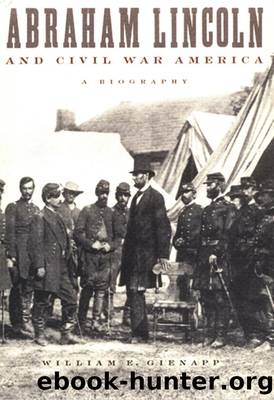Abraham Lincoln and Civil War America by William E. Gienapp

Author:William E. Gienapp
Language: eng
Format: epub
Publisher: Oxford University Press
Published: 2002-06-14T16:00:00+00:00
LINCOLN WORRIED about the effect the proclamation would have on the upcoming state and congressional elections in the North. Indeed, in cabinet discussions Montgomery Blair had opposed issuing the proclamation out of fear that it would give the Democrats “a club to be used against us” in the elections. Following the initial burst of bipartisan enthusiasm when the war began, the Democratic party had become increasingly divided over the war and Lincoln’s policies. Hoping to cement Democratic support for the war effort, Lincoln appointed a number of prominent Democrats to important military commands, but the hard fighting and heavy losses of 1862, coupled with Lincoln’s policies on slavery and civil liberties, ended the possibility of a bipartisan war effort.
Three major Democratic factions emerged. War Democrats were willing to heed Lincoln’s call for suspension of partisanship during the war. They generally backed the Lincoln administration and its policies, and in many states joined Republicans in forming Union coalition tickets. A number of war Democrats ended up becoming Republicans. Regular Democrats constituted the largest wing of the party. They supported a war to save the Union, but opposed emancipation and condemned Lincoln’s interference with civil liberties. The final group was the peace Democrats. Republicans labeled them Copperheads, after the poisonous snake, and charged they were aiding the Confederacy by trying to kill the Union from within. Peace Democrats called for negotiations with the Confederacy, and many were ready to accept disunion rather than continue the war. They were never a majority of Democrats, but they made a lot of noise and commanded a great deal of attention. In the process, they tarred the Democratic party with the popular image of disloyalty.
The target of various disaffected groups, Lincoln took a hands-off approach in the 1862 fall elections. One reason was that he was unwilling to get involved in the bitter factional quarrels that divided Republicans in many states. But he also knew his unpopularity limited any impact he might have. He conceded to his cabinet, “I believe that I have not so much of the confidence of the people as I had some time since.” Observers noted the toll that the war was taking on him. “His introverted look and his half-staggering gait were like those of a man walking in sleep,” one visitor to Washington reported. His face “revealed the ravages which care, anxiety, and overwork had wrought.” Noah Brooks, who had first met Lincoln in Illinois in 1856, was shocked at the change in his appearance. He seemed “prematurely aged,” and in place of the previous sparkle there was “a sunken, deathly look about the large, cavernous eyes.”
Focusing on the issues of emancipation, civil liberties, and the conduct of the war, Democrats made a political comeback in the fall elections. In New York, Horatio Seymour was elected governor, and Democrats won control of the legislatures in Indiana and Illinois, which had holdover Republican governors. Moreover, the party picked up thirty-two seats in the next House of Representatives. The Republican New York Times pronounced the results a “vote of want of confidence” in the president.
Download
This site does not store any files on its server. We only index and link to content provided by other sites. Please contact the content providers to delete copyright contents if any and email us, we'll remove relevant links or contents immediately.
| American Revolution | Civil War |
| US Presidents |
Fanny Burney by Claire Harman(25784)
Empire of the Sikhs by Patwant Singh(22173)
Out of India by Michael Foss(16312)
Leonardo da Vinci by Walter Isaacson(11903)
Small Great Things by Jodi Picoult(6095)
The Six Wives Of Henry VIII (WOMEN IN HISTORY) by Fraser Antonia(4791)
The Wind in My Hair by Masih Alinejad(4424)
The Lonely City by Olivia Laing(4120)
The Crown by Robert Lacey(4105)
A Higher Loyalty: Truth, Lies, and Leadership by James Comey(4033)
The Iron Duke by The Iron Duke(3639)
Millionaire: The Philanderer, Gambler, and Duelist Who Invented Modern Finance by Janet Gleeson(3569)
Sticky Fingers by Joe Hagan(3454)
Alive: The Story of the Andes Survivors by Piers Paul Read(3311)
Papillon (English) by Henri Charrière(3269)
Joan of Arc by Mary Gordon(3259)
Stalin by Stephen Kotkin(3086)
Aleister Crowley: The Biography by Tobias Churton(3020)
Ants Among Elephants by Sujatha Gidla(2925)
